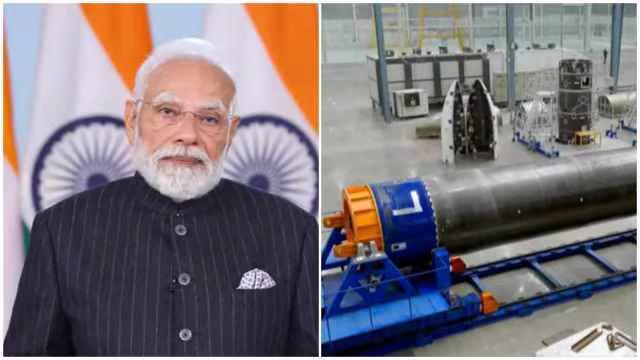
PM Modi Unveils Vikram-1, India’s First Privately Developed Orbital Rocket
In a historic moment for India’s space sector, Prime Minister Narendra Modi on Thursday inaugurated the Infinity Campus of space startup Skyroot Aerospace via video conferencing. During the event, PM Modi also unveiled Vikram-1, India’s first privately developed orbital rocket. This significant leap forward for the country’s space sector has generated immense excitement and enthusiasm among the scientific community and the general public alike.
The inauguration of the Infinity Campus and the unveiling of Vikram-1 are testaments to India’s growing capabilities in the space sector. The Infinity Campus, which is the new facility of Skyroot Aerospace, is designed to be a state-of-the-art hub for innovation and production of rockets. According to Skyroot Founder Pawan Chandana, the Infinity Campus would be capable of producing one rocket every month, which is a remarkable feat.
The Vikram-1 rocket, named after the renowned Indian scientist Vikram Sarabhai, is a significant milestone in India’s space program. As the country’s first privately developed orbital rocket, it marks a new era of collaboration between the government and private sector in the space industry. The development of Vikram-1 is a result of the efforts of Skyroot Aerospace, a startup that has been working tirelessly to create a world-class rocket that can cater to the needs of the global space market.
A New Era for India’s Space Sector
The unveiling of Vikram-1 and the inauguration of the Infinity Campus are significant events that highlight the rapid progress being made in India’s space sector. In recent years, India has emerged as a major player in the global space industry, with a number of notable achievements, including the successful launch of the Mars Orbiter Mission and the Chandrayaan-1 lunar mission.
The development of Vikram-1 is a result of the government’s efforts to promote private sector participation in the space industry. The Indian Space Research Organisation (ISRO) has been working closely with private companies, including Skyroot Aerospace, to create a vibrant ecosystem that can support the growth of the space sector.
The Role of Private Sector in India’s Space Program
The private sector is expected to play a major role in India’s space program, with companies like Skyroot Aerospace leading the way. The development of Vikram-1 is a testament to the capabilities of Indian startups and their ability to innovate and create world-class products.
The involvement of the private sector in the space industry is expected to bring in new ideas, technologies, and investment, which can help to accelerate the growth of the sector. The government has been actively promoting the private sector’s participation in the space industry through various initiatives, including the creation of a new space policy that encourages private sector participation.
The Significance of Vikram-1
Vikram-1 is a significant milestone in India’s space program, as it marks the country’s entry into the global market for small satellite launch vehicles. The rocket is designed to cater to the growing demand for small satellite launches, which is expected to be a major driver of growth in the space industry in the coming years.
The development of Vikram-1 is also a testament to India’s capabilities in rocket technology. The rocket is equipped with advanced technologies, including a highly efficient propulsion system and a state-of-the-art navigation system.
Conclusion
The unveiling of Vikram-1 and the inauguration of the Infinity Campus are significant events that highlight the rapid progress being made in India’s space sector. The development of Vikram-1 is a result of the efforts of Skyroot Aerospace, a startup that has been working tirelessly to create a world-class rocket that can cater to the needs of the global space market.
As PM Modi said during the launch, “It’s a significant leap forward for India’s space sector.” The event marks a new era of collaboration between the government and private sector in the space industry, and is expected to accelerate the growth of the sector in the coming years.
The Infinity Campus, which is capable of producing one rocket every month, is a significant asset for India’s space program, and is expected to play a major role in the country’s efforts to become a major player in the global space industry.
In conclusion, the unveiling of Vikram-1 and the inauguration of the Infinity Campus are significant events that highlight the rapid progress being made in India’s space sector. The development of Vikram-1 is a testament to India’s capabilities in rocket technology, and marks a new era of collaboration between the government and private sector in the space industry.





